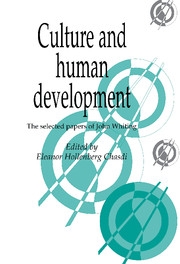Book contents
- Frontmatter
- Contents
- List of figures
- Preface
- Acknowledgments
- Introduction: John Whiting and anthropology
- Fifty years as a behavioral scientist: autobiographical notes
- Part I Theory and methods
- Part II Environment and history
- Introduction
- 4 Environmental constraints on infant care practices
- 5 The learning of values
- Part III Moral development
- Part IV Gender development
- Part V Development of social behavior
- Bibliography
- Complete bibliography of John W. M. Whiting's work
- Index
Introduction
Published online by Cambridge University Press: 23 December 2009
- Frontmatter
- Contents
- List of figures
- Preface
- Acknowledgments
- Introduction: John Whiting and anthropology
- Fifty years as a behavioral scientist: autobiographical notes
- Part I Theory and methods
- Part II Environment and history
- Introduction
- 4 Environmental constraints on infant care practices
- 5 The learning of values
- Part III Moral development
- Part IV Gender development
- Part V Development of social behavior
- Bibliography
- Complete bibliography of John W. M. Whiting's work
- Index
Summary
This part contains two articles which highlight the factors of environment and history. The first discusses the effects of the physical environment on certain infant care practices. The second emphasizes the role of historical forces in shaping cultural values.
It should be noted that the importance of the physical environment is also addressed in the section on gender development in the article entitled, “The effects of climate on certain cultural practices.” In addition, the shaping of cultural values is one of the main themes in the section on the development of social behavior. The reader can benefit by considering each of these articles in the context of the other sections of the book, despite the editorial necessity for making choices.
The first article, “Environmental constraints on infant care practices,” explores the relationship between the physical environment and some aspects of infant care practices. The results indicate that infants in cold climates tend to be carried in cradles, amply swaddled, and rest, nap, and sleep in their cradles. Infants in warm climates are usually carried in slings and shawls on their caretakers' backs, with little or no clothing, and sleep next to their mothers at night. The article includes: 1) rich ethnographic descriptions of infant carrying and sleeping arrangements, a “world tour through the ethnographic reports,” discussing the regions of Africa, Circum-Mediterranean, East Eurasia, Insular Pacific, North and South America; 2) careful and sophisticated methodological analyses testing the hypothesis between climate and infant care practices within three separate world regions to see if the relationship is supported in each area, and is therefore the result of differences in climate and not differences in historically determined common origins; 3) an excellent theoretical discussion of the implications, if any, of these variations in infant care and mother–child relationships and later personality development.
- Type
- Chapter
- Information
- Culture and Human DevelopmentThe Selected Papers of John Whiting, pp. 105 - 106Publisher: Cambridge University PressPrint publication year: 1993



